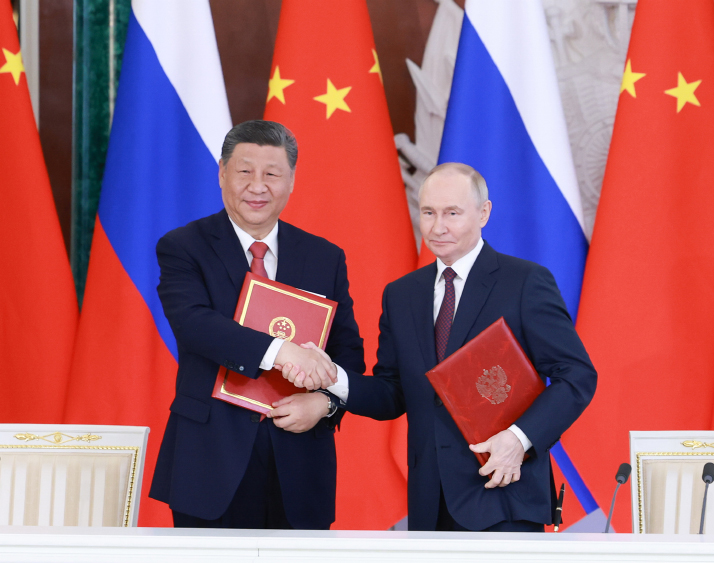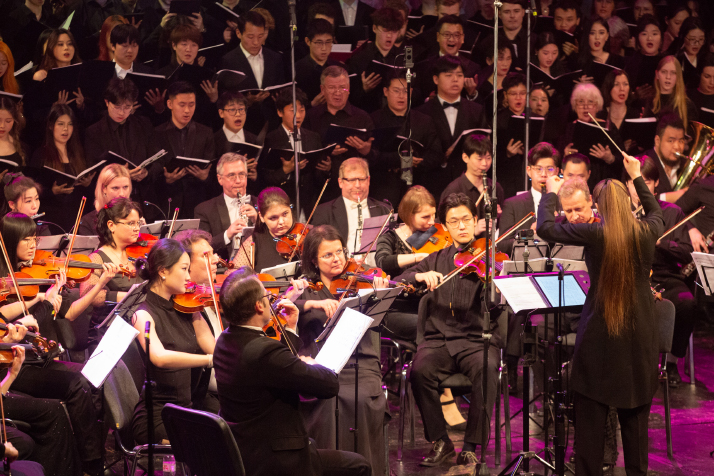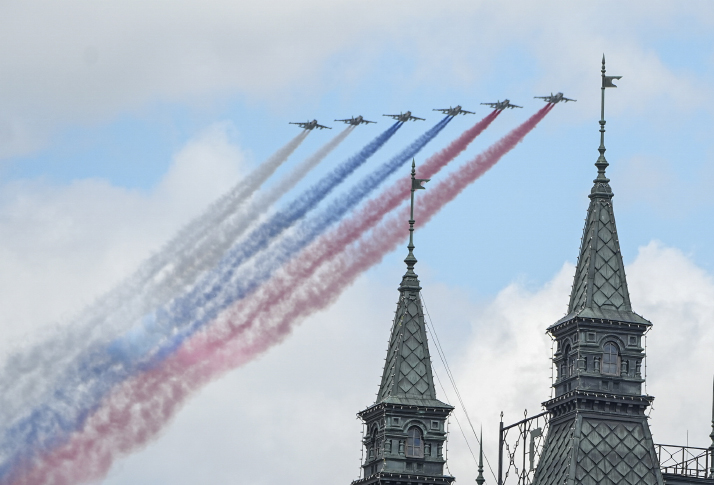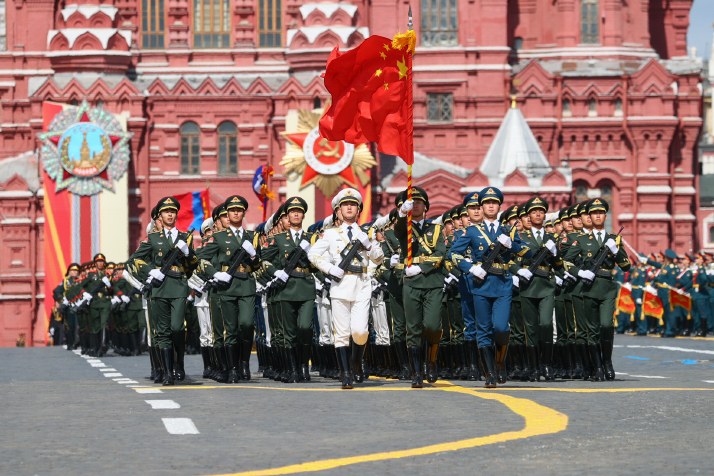| World |
| China, Russia to shoulder special responsibility amid rising unilateralism | |
|
|
 Chinese President Xi Jinping and Russian President Vladimir Putin pose for the press after signing a joint statement on further deepening the China-Russia comprehensive strategic partnership of coordination for a new era in Moscow, Russia, on May 8 (XINHUA)
Beneath the grandeur of Red Square in Moscow, banners of victory danced in the breeze, and medals of glory sparkled in the light. As the stirring strains of Katyusha, a popular Russian wartime song, filled the air, a proud phalanx of Russian women soldiers marched forth in noble review. A decade ago, to that same melody, the resolute steps of the Guard of Honor of the Chinese People's Liberation Army (PLA) echoed across this historic square, their presence etched into proud memory. On May 9, Chinese President Xi Jinping rose from his seat as the PLA unit passed through the square. He joined Russian President Vladimir Putin and more than 20 other leaders for the celebrations marking the 80th anniversary of the victory in the Soviet Union's Great Patriotic War, during his state visit to the country at Putin's invitation. While holding talks with Putin on May 8, Xi called for promoting the correct historical perspective on World War II (WWII), maintaining the authority and status of the United Nations (UN), and safeguarding international justice and fairness. In the face of the countercurrent of unilateralism and the act of power politics and bullying in the world, China will work with Russia to shoulder their special responsibility as major countries of the world and permanent members of the UN Security Council, Xi added. The two leaders exchanged in-depth views on bilateral ties and major international and regional issues, reaching consensus on unwaveringly deepening strategic coordination and promoting the stable, healthy and high-level development of China-Russia relations.  Chinese and Russian musicians perform at the Eternal Remembrance concert commemorating the 80th anniversary of the victory in the Chinese People's War of Resistance Against Japanese Aggression and the Soviet Union's Great Patriotic War in St. Petersburg, Russia, on April 25 (XINHUA)
Robust ties The visit is Xi's 11th trip to Russia since he became Chinese president in 2013 and the two heads of state have met more than 40 times on various occasions. China and Russia have found a correct path for state-to-state interactions between neighboring major countries, Xi said in a written statement upon his arrival in Moscow on May 7. The two countries, as good neighbors that cannot be moved apart, true friends who share weal and woe, and good partners of mutual achievement, have forged a spirit of strategic coordination for a new era, which features permanent good-neighborly friendship, comprehensive strategic coordination and mutually beneficial cooperation, he added. According to the General Administration of Customs of China, two-way trade amounted to more than $244 billion in 2024, making China the largest trading partner of Russia for 15 consecutive years. The two nations have achieved positive cooperation outcomes in traditional areas of strength such as energy, agriculture, aerospace and infrastructure, while demonstrating robust momentum in emerging fields like cross-border e-commerce and green development, Sun Zhuangzhi, Director of the Institute of Russian, Eastern European and Central Asian Studies of the Chinese Academy of Social Sciences (CASS), told Beijing Review. The long-lasting friendship between the two neighbors has grown increasingly popular among their peoples. The mutual visa exemption agreement for group tours—signed in 2000, suspended during the COVID-19 pandemic and resumed in 2023—has greatly increased cross-border tourism. Hundreds of cultural events have been held in succession within the framework of the China-Russia Years of Culture in 2024 and 2025. While talking with Putin, Xi said the two sides should stick to the general course of cooperation and fend off external disruptions, so as to solidify the foundation for stable collaboration and ensure stronger momentum for progress. Both should take the synergies between the Belt and Road Initiative (a China-proposed initiative to boost connectivity along and beyond the ancient Silk Road routes) and the Eurasian Economic Union (a Russia-led regional economic bloc aiming to optimize the flow of goods and services among its members, with the other four being Armenia, Belarus, Kazakhstan and Kyrgyzstan) as a platform to build a high-standard connectivity pattern, Xi said, adding that the two sides should closely coordinate and cooperate on multilateral platforms such as the UN, the Shanghai Cooperation Organization (an Eurasian political, economic and security organization) and BRICS (a group of emerging economies originally consisting of Brazil, Russia, India, China and South Africa), unite the Global South (which consists of nations that are generally characterized by relatively low levels of economic and industrial development, typically located to the south of more industrialized nations), uphold true multilateralism, and steer in the right direction of global governance reform.  Aircraft fly in formation during a military parade marking the 80th anniversary of the victory in the Soviet Union's Great Patriotic War in Moscow on May 9 (XINHUA)
Cherishing history "History is the life of nations and of humanity," the great Russian author Leo Tolstoy wrote in War and Peace. On the night of May 8, 1945, Germany signed the surrender document in Karlshorst, Berlin, marking the end of WWII in Europe. Meanwhile in Moscow, it was already May 9, which was designated by the Soviet Union and later Russia as Victory Day. Since 1995, Russia has been holding military parades and other commemorative events every year on May 9. This year is also the 80th anniversary of the victory in the Chinese People's War of Resistance Against Japanese Aggression and the World Anti-Fascist War. The Soviet Union was the principal theater of WWII in Europe, losing 27 million lives, while China was the main theater in Asia, suffering 35 million casualties in its resistance against the bulk of Japanese militarist forces. Together, the two countries served as the mainstay of resistance against Japanese militarism and German Nazism, making pivotal contributions to the victory in the World Anti-Fascist War. In a signed article published in the Russian Gazette newspaper ahead of his arrival in Moscow, Xi recalled that 10 years ago, he came to Russia to celebrate the 70th anniversary of the victory. During that visit, he met with 18 representatives of Russian veterans who endured the blood and fire of battlefields during the Soviet Union's Great Patriotic War and the Chinese People's War of Resistance Against Japanese Aggression. "Their unyielding resolve and indomitable bearing left an indelible impression on me," Xi wrote. "Heroes never perish; their noble spirit lives forever." "Any attempt to distort the historical truth of WWII, deny its victorious outcome, or defame the historic contribution of China and the Soviet Union is doomed to fail," Xi added. Andrey Denisov, First Deputy Chair of Russia's Federation Council Committee on Foreign Affairs and former Russian Ambassador to China, applauded Xi's notion of upholding a correct view of WWII history. "Safeguarding the truth of historical memory and revisiting those moments that connect our two countries and peoples holds special significance," Denisov told Xinhua News Agency. After their talks, Xi and Putin signed a joint statement on further deepening the China-Russia comprehensive strategic partnership of coordination for a new era. Li Yonghui, a research fellow at the CASS Institute of Russian, Eastern European and Central Asian Studies, told Beijing Review that the joint statement not only represents a shared commemoration of history but also a strategic blueprint for the future development of bilateral relations, reflecting the sense of responsibility and vision for cooperation between China and Russia amid profound global changes. The opening section of the joint statement emphasizes the enormous sacrifices and contributions made by China and Russia to the cause of global peace during WWII, and highlights plans for joint commemorative activities to urge the international community to remember the lessons of history. This part of the document counters historical nihilism, as China and Russia work to correct attempts by some countries to distort the facts of WWII and glorify aggression, Li explained, adding it reinforces shared values—the principles of peaceful coexistence and multilateralism established by the victory in the World Anti-Fascist War remain central to today's international order. The joint statement also proposes to deepen people-to-people ties, consolidating the social foundation of bilateral relations through initiatives like historical education and youth exchanges, she added.  The Guard of Honor of the Chinese People's Liberation Army attend a grand parade marking the 80th anniversary of the victory in the Soviet Union's Great Patriotic War in Moscow on May 9 (XINHUA)
Upholding multilateralism
Twelve years ago, during Xi's visit to Russia, Putin hosted a welcome banquet where the band played Katyusha. This time, when Xi had successfully completed all his scheduled activities and was about to depart for home, the Russian military band once again played the song to pay tribute to the two countries' shared victory and to their profound friendship. Xi's recent visit to Russia further strengthened the political mutual trust between the two countries, clarified the future direction and key areas of bilateral cooperation, deepened cultural and people-to-people exchange, solidified public support in both nations, boosted international confidence in China-Russia relations, and promoted greater collaboration and coordination between the two sides in international affairs, Li said. Both sides have repeatedly emphasized that China and Russia, as independent forces in the advancement of a multipolar world, should uphold the authority of the UN, Sun said, adding that they expressed their willingness to strengthen coordination within the frameworks of the UN Security Council, the UN General Assembly and other UN bodies, in order to promote fair and lasting solutions to global issues. "The more turbulent and complex the international situation becomes, the more we must uphold and defend the authority of the UN," Xi wrote in his signed article. The world needs justice, not hegemonism, Xi said, adding that history and reality have proven that to meet global challenges, it is important to uphold the vision of global governance featuring extensive consultation and joint contribution for shared benefit. It is equally important to practice true multilateralism, accommodate the legitimate concerns of all parties and safeguard international norms and order, he said. When jointly meeting the press with Putin after their talks at the Kremlin, Xi said as forces for stability, progress and development in the international community, China and Russia should continue to firmly stand together, resolutely safeguard the UN-centered international system and the international order underpinned by international law, and continuously promote an equal and orderly multipolar world. "The establishment of an international system with the UN at its core is not easy at all, and must be firmly maintained by all countries of the world," Ekaterina Zaklyazminskaya, leading researcher at the Institute of China and Modern Asia at the Russian Academy of Sciences, told Xinhua. "Russia and China support true multilateralism, which is very important at this time," she added. (Print Edition Title: A Broader Path) Copyedited by G.P. Wilson Comments to mamm@cicgamericas.com |
|
||||||||||||||||||||||||||||||
|